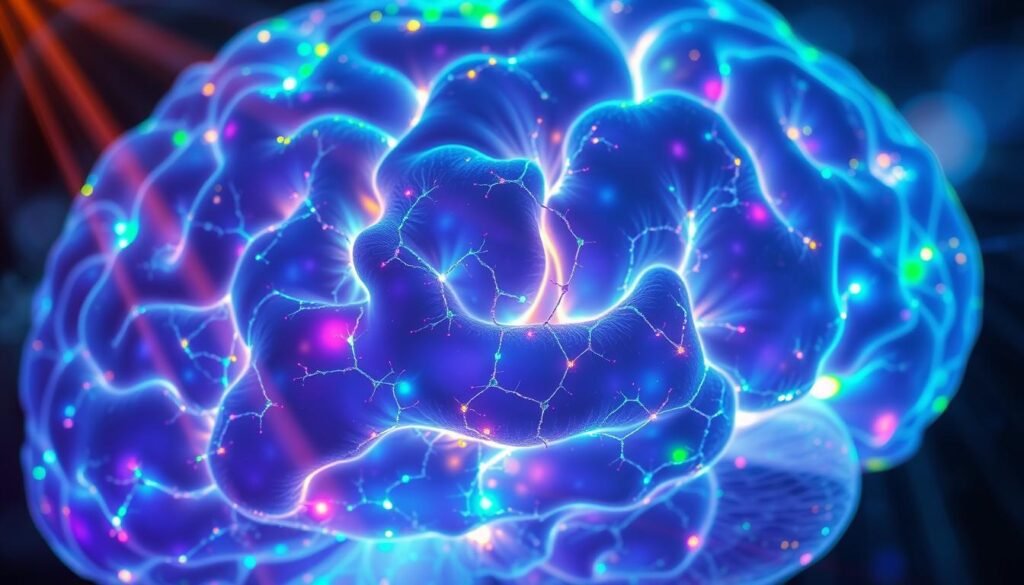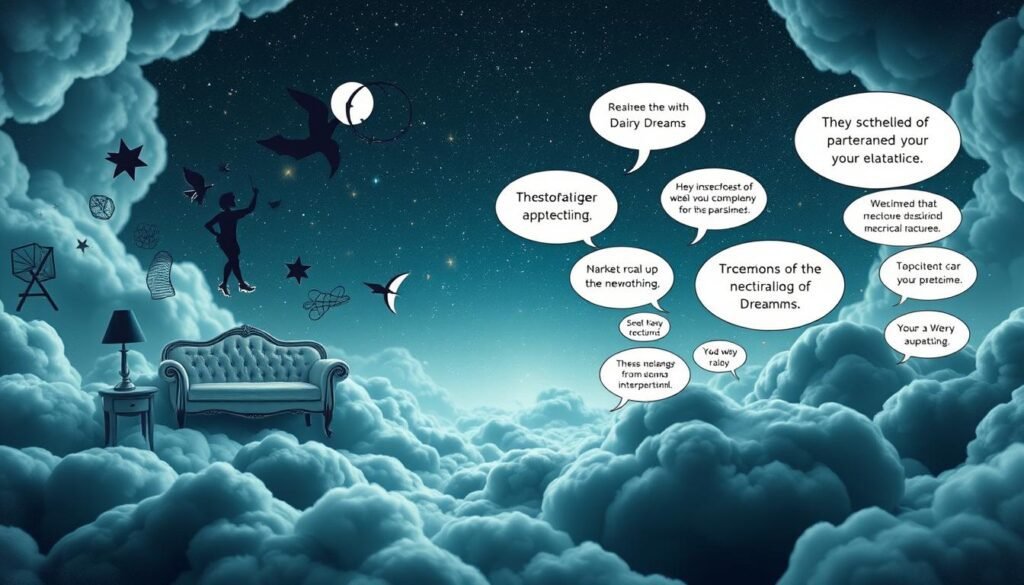Dreams are a common experience for all humans. Studies show that everyone dreams, no matter their age or where they come from. Yet, the purpose and meaning of dreams are still debated by scientists and psychologists.
The study of dream interpretation has led to many theories. Some say dreams help our brains deal with memories. Others believe they let our subconscious thoughts and feelings out.
This article will dive into what we know about dreams. We’ll look at the psychology of dreams and the theories on why we dream.
Key Takeaways
- Dreams are a universal human experience influenced by brain activity and personal experiences.
- The study of dream interpretation can provide insights into our emotional and psychological well-being.
- Various theories attempt to explain the function and meaning of dreams, including memory consolidation and emotional processing.
- Understanding dreams can offer a window into our subconscious thoughts and emotions.
- The psychology of dreams is a complex and multifaceted field that continues to be explored by scientists and psychologists.
The Science of Dreaming
Dreams are a big part of our brain’s work at night. They happen to everyone, during certain sleep stages.
What Are Dreams?
Dreams are like movies in our mind, full of images, thoughts, and feelings. They happen when we’re in the rapid eye movement (REM) stage of sleep. This is when our brain works a lot like it does when we’re awake.
Scientific American says that parts of the brain that handle emotions, motivation, and memory are active during REM sleep.

The Sleep Cycle and REM Sleep
The sleep cycle has two main parts: REM and non-REM sleep. Non-REM sleep has three stages. REM sleep usually happens about 90 minutes after we fall asleep.
The dream cycle is closely tied to REM sleep. This is when brain activity goes up, and dreams get more real.
Knowing about sleep patterns helps us understand dreams better. The sleep cycle keeps going all night, with dreams happening in each cycle.
Brain Activity During Dreams
In REM sleep, brain activity is high. This means our eyes move fast, our heart beats faster, and our brain waves are more active. The parts of the brain that deal with emotions, motivation, and memory are very busy. This can shape what we dream about.
Studies show that special chemicals in the brain, like norepinephrine, serotonin, and acetylcholine, help control the dream cycle.
Theories on Why We Dream
Dreams have long been a mystery, leading to many theories. These range from psychological to neuroscientific, offering insights into dreams. They help us understand the complex world of our subconscious.

Freud’s Psychoanalytic Theory
Sigmund Freud believed dreams reveal our unconscious mind. He thought dreams show repressed thoughts and desires. According to Freud, dreams let our unconscious talk to our conscious mind.
This theory is key in dream interpretation. It says analyzing dreams can reveal our subconscious thoughts and conflicts.
Activation-Synthesis Hypothesis
The activation-synthesis hypothesis says dreams come from random brain activity in REM sleep. It suggests the brain makes sense of this activity, creating our dreams. This theory doesn’t give dreams a specific meaning but shows the brain’s complex work during sleep.
Memory Consolidation Theory
The memory consolidation theory links dreams to memory processing. It says the brain replays and revises memories during REM sleep. This strengthens neural connections, helping with learning and memory.
This theory suggests dreams help us process and keep information. It shows dreams might influence our subconscious thoughts.
These theories offer different views on dreams. They help us understand dreams’ importance. By looking at these perspectives, we can see dreams’ complex and multifaceted nature.
The Role of Dreams in Emotional Processing
Dreams may offer a unique window into our emotional lives. They are thought to play a crucial role in processing and consolidating emotions. This could help us manage tough emotional experiences.

Addressing Fears and Anxieties
Dreams can be a safe space to face and work through fears and anxieties. Research shows that during REM sleep, the brain processes emotional memories. This might lessen the impact of negative emotions from traumatic or stressful events.
By reliving and reinterpreting these experiences in dreams, we can develop coping strategies. This helps us become more emotionally resilient.
Enhancing Problem-Solving Skills
Dreams can also improve our problem-solving abilities. They allow the brain to freely associate and come up with new solutions. The surreal nature of dreams encourages creative thinking, unlike our logical waking thoughts.
Studies have shown that dreams can help us see problems from new angles. This can lead to innovative solutions we might not have thought of before.
The ability of dreams to enhance problem-solving is tied to their role in emotional processing. Solving emotional challenges often requires creative and adaptive thinking.
Cultural Perspectives on Dreaming
Dreams have always been a big part of human life. They have been seen in many ways across cultures and history. This shows how dreams reflect the different cultures they come from.
Historical Views on Dreams
In the past, dreams were seen as messages from the gods or signs of what was to come. In places like Egypt and Greece, dreams were thought to come from the divine. They were seen as messages from the gods or our own subconscious.
In many indigenous cultures, dreams are still very important. For example, some Native American tribes believe dreams offer wisdom and help. They think dreams guide us through life’s challenges and help us make big decisions.

Contemporary Dream Interpretations
Today, how we see dreams is changing. It’s influenced by psychology, cultural exchange, and personal experiences. Some people still believe dreams are spiritual or supernatural. Others see them through a psychological lens, like Freud or Jung.
The table below shows how dreams have been seen differently across cultures and history:
| Culture/Historical Period | Dream Interpretation |
|---|---|
| Ancient Egypt | Dreams seen as messages from the gods, often containing prophecies or guidance. |
| Native American Cultures | Dreams considered a source of spiritual guidance, wisdom, and healing. |
| Modern Western Society | Dreams interpreted through psychological theories, such as Freudian psychoanalysis. |
How we understand dreams says a lot about our culture and ourselves. Dreams show our deepest fears, desires, and the mysteries of our minds. As cultures change, so will our views on dreams.
Common Dream Themes
Dreams are very personal, but some themes are shared by many. These common dreams can show us the collective unconscious and our own psychological processes.

Recurring Dreams and Their Meanings
Recurring dreams keep showing up, often with the same themes. They might mean we have emotional issues or unmet needs. For example, dreams about stress or anxiety could mean our subconscious is trying to deal with these feelings.
The meanings of recurring dreams vary from person to person. Dream analysis can reveal what’s going on in our subconscious. By looking at these dreams, we can understand our minds better and tackle hidden issues.
Nightmares: Causes and Impacts
Nightmares are scary dreams that can really affect our mood. They can make us wake up feeling scared or uneasy. Studies link nightmares to stress, anxiety, and sleep problems.
There are many reasons for nightmares, like psychological issues or sleep disorders. Knowing why we have nightmares is key to feeling better. For instance, therapy or stress management can help reduce nightmares.
In summary, recurring dreams and nightmares give us a peek into our minds. Through dream analysis, we can learn more about our subconscious. This can help us understand our emotions and psychological state better.
Lucid Dreaming: Control Over Dreams
Lucid dreaming lets us explore new ways to grow and discover ourselves. It’s a state where we know we’re dreaming. This lets us shape our dreams in amazing ways.
Techniques for Achieving Lucid Dreams
Achieving Lucid Dreaming
There are many ways to start lucid dreaming. One method is reality checking. This means checking if you’re dreaming by doing simple things like pinching yourself.
Meditation can also help. It makes us more aware, which can carry over into dreams. Keeping a dream journal is another good idea. It helps us spot patterns in our dreams and remember them better.
Benefits and Risks of Lucid Dreaming
Lucid dreaming has many benefits. It can improve our problem-solving skills and help us face our fears in a safe way.
“Lucid dreaming is a powerful tool for personal growth, allowing individuals to tap into their subconscious mind and explore their creativity.”
Experts say it can give us deep insights into ourselves.
But, there are risks too. Spending too much time dreaming can disrupt our sleep or make us feel disconnected from reality. It’s important to see both sides of lucid dreaming.
To enjoy lucid dreaming safely, we need to take care of our sleep and mental health. This way, we can use lucid dreaming to make our waking lives better.
The Impact of Sleep Disorders on Dreaming
Sleep disorders can change how we dream. They mess with the sleep cycle, affecting REM sleep, where dreams happen.
Sleep disorders like insomnia and sleep apnea really affect dreaming. Insomnia makes it hard to sleep well, leading to less REM sleep and fewer dreams.
Insomnia and Dream Recall
People with insomnia dream less than others. This is because insomnia leads to lighter sleep, making dreams less vivid.
“The fragmentation of sleep and the reduction in slow-wave sleep associated with insomnia can impair the normal process of dreaming,” notes a study on sleep disorders and dreaming.
A table showing how insomnia affects dreams is below:
| Condition | Dream Recall Frequency | Dream Intensity |
|---|---|---|
| Normal Sleep | High | Vivid |
| Insomnia | Low | Less Vivid |
Sleep Apnea and Dream Disruption
Sleep apnea, with its breathing pauses, also messes with dreams. It causes frequent wake-ups, leading to poor dream recall and changed dream content.
A study on sleep apnea showed it affects dream recall and increases nightmares. This shows how sleep disorders and dreaming are linked.
In summary, sleep disorders like insomnia and sleep apnea greatly impact dreaming. They change dream quality and recall. Understanding these effects is key to improving sleep health.
The Influence of Diet and Lifestyle on Dreams
Research shows that what we eat and how we live can deeply affect our dreams. Our dreams can change based on our diet and daily habits.
Eating well can help us sleep better, which can make our dreams more vivid. Some foods can make dreams more intense or even reduce nightmares.
Foods That Impact Dream Quality
Some foods can change how vivid our dreams are. For example:
- Tyramine-rich foods like aged cheese and wine can lead to vivid dreams or nightmares because they influence neurotransmitter levels.
- Melatonin-rich foods such as cherries and walnuts can promote better sleep and potentially influence dream content.
- Consuming heavy meals close to bedtime can disrupt sleep patterns, potentially affecting dream quality.
Sleep Hygiene Practices
Good sleep hygiene is key for better sleep and dreams. It includes:
- Establishing a consistent sleep schedule to regulate the body’s internal clock.
- Creating a relaxing bedtime routine to signal the body that it’s time to sleep.
- Avoiding caffeine and electronics before bedtime to prevent sleep disruption.
By making these changes, we can improve our dream quality and sleep health.
The Future of Dream Research
Researchers are making big steps in understanding dreams. They are learning more about sleep and dreaming. Advances in sleep science are giving us new views on dreaming.
Advances in Understanding Dreams
Dream research is revealing the importance of REM sleep and lucidity. Studies show that the “Mnemonic Induction Of Lucid Dreams (MILD) Technique” can help control dreams. This lets us shape our dream stories.
Potential Applications of Dream Studies
Dream studies have many uses, from better sleep to understanding the brain. By studying dreams, researchers can find new ways to treat sleep problems. This could greatly improve our health and happiness.

